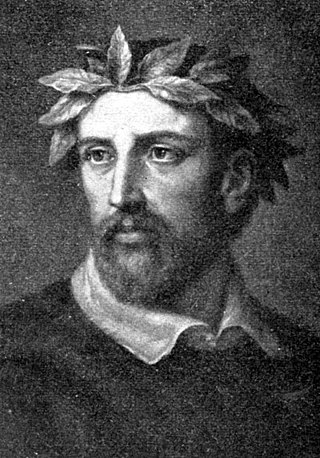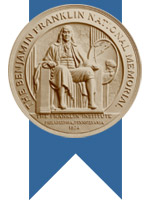
The Nobel Prizes are five separate prizes that, according to Alfred Nobel's will of 1895, are awarded to "those who, during the preceding year, have conferred the greatest benefit to humankind." Alfred Nobel was a Swedish chemist, engineer, and industrialist most famously known for the invention of dynamite. He died in 1896. In his will, he bequeathed all of his "remaining realisable assets" to be used to establish five prizes which became known as "Nobel Prizes". Nobel Prizes were first awarded in 1901.

The Swedish Academy, founded in 1786 by King Gustav III, is one of the Royal Academies of Sweden. Its 18 members, who are elected for life, comprise the highest Swedish language authority. Outside Scandinavia, it is best known as the body that chooses the laureates for the annual Nobel Prize in Literature, awarded in memory of the donor Alfred Nobel.

The Nobel Prize in Physics is a yearly award given by the Royal Swedish Academy of Sciences for those who have made the most outstanding contributions for humankind in the field of physics. It is one of the five Nobel Prizes established by the will of Alfred Nobel in 1895 and awarded since 1901, the others being the Nobel Prize in Chemistry, Nobel Prize in Literature, Nobel Peace Prize, and Nobel Prize in Physiology or Medicine. Physics is traditionally the first award presented in the Nobel Prize ceremony.

A poet laureate is a poet officially appointed by a government or conferring institution, typically expected to compose poems for special events and occasions. Albertino Mussato of Padua and Francesco Petrarca (Petrarch) of Arezzo were the first to be crowned poets laureate after the classical age, respectively in 1315 and 1342. In Britain, the term dates from the appointment of Bernard André by Henry VII of England. The royal office of Poet Laureate in England dates from the appointment of John Dryden in 1668.
The Dirac Medal or Dirac prize can refer to different awards named in honour of the physics Nobel Laureate Paul Dirac.

Sheldon Lee Glashow is a Nobel Prize-winning American theoretical physicist. He is the Metcalf Professor of Mathematics and Physics at Boston University and Eugene Higgins Professor of Physics, emeritus, at Harvard University, and is a member of the board of sponsors for the Bulletin of the Atomic Scientists.
Hermann Müller may refer to:

Steve Chen is a Taiwanese-born American Internet entrepreneur who is one of the co-founders and previous chief technology officer of the American video-sharing website YouTube. After he co-founded the company AVOS Systems, Inc. and built the video-sharing app MixBit, he joined Google Ventures in 2014.

The L'Oréal-UNESCO For Women in Science Awards, created in 1998, aim to improve the position of women in science by recognizing outstanding women researchers who have contributed to scientific progress. The awards are a result of a partnership between the French cosmetics company L'Oréal and the United Nations Educational, Scientific and Cultural Organization (UNESCO) and carry a grant of $100,000 USD for each laureate. This award is also known as the L'Oréal-Helena Rubinstein Women in Science Awards.

Valeriya is the stage name of Alla Yurievna Perfilova, a Russian singer and fashion model. Valeriya, who is a recipient of the titles People's Artist of Russia (2013) and People's Artist of the Pridnestrovian Moldavian Republic (2016), has also won numerous awards, including Golden Gramophone (thirteen), Pesnya goda (thirteen), Muz-TV, and MTV Russia Music Awards. She has been a member of the Council for Culture and Art under the President of the Russian Federation since 2012.

The Infosys Prize is an annual award given to scientists, researchers, engineers and social scientists of Indian origin by the Infosys Science Foundation and ranks among the highest monetary awards in India to recognize research. The prize for each category includes a gold medallion, a citation certificate, and prize money of US$100,000. The prize purse is tax free in the hands of winners in India. The winners are selected by the jury of their respective categories, headed by the jury chairs.

The Nobel Prize in Literature is a Swedish literature prize that is awarded annually, since 1901, to an author from any country who has, in the words of the will of Swedish industrialist Alfred Nobel, "in the field of literature, produced the most outstanding work in an idealistic direction". Though individual works are sometimes cited as being particularly noteworthy, the award is based on an author's body of work as a whole. The Swedish Academy decides who, if anyone, will receive the prize. The academy announces the name of the laureate in early October. It is one of the five Nobel Prizes established by the will of Alfred Nobel in 1895. Literature is traditionally the final award presented at the Nobel Prize ceremony. On some occasions, the award has been postponed to the following year, most recently in 2018 as of July 2023.

The Nobel Prize in Chemistry is awarded annually by the Royal Swedish Academy of Sciences to scientists in the various fields of chemistry. It is one of the five Nobel Prizes established by the will of Alfred Nobel in 1895, awarded for outstanding contributions in chemistry, physics, literature, peace, and physiology or medicine. This award is administered by the Nobel Foundation, and awarded by the Royal Swedish Academy of Sciences on proposal of the Nobel Committee for Chemistry which consists of five members elected by the Academy. The award is presented in Stockholm at an annual ceremony on 10 December, the anniversary of Nobel's death.
University of Madrid may refer to:

The Franklin Institute Awards is an American science and engineering award presented by the Franklin Institute, a science museum in Philadelphia. The Franklin Institute awards comprises the Benjamin Franklin Medals in seven areas of science and engineering, the Bower Awards and Prize for Achievement in Science, and the Bower Award for Business Leadership. Since 1824, the institute has recognized "world-changing scientists, engineers, inventors, and industrialists—all of whom reflect Benjamin Franklin’s spirit of curiosity, ingenuity, and innovation". Some of the noted past laureates include Nikola Tesla, Thomas Edison, Marie Curie, Max Planck, Albert Einstein, Stephen Hawking. Some of the 21st century laureates of the institute awards are Bill Gates, James P. Allison, Indra Nooyi, Jane Goodall, Elizabeth Blackburn, George Church, Robert S. Langer, and Alex Gorsky.

The World Summit of Nobel Peace Laureates was initiated by Mikhail Gorbachev in the 1990s, as a forum in which the Nobel Peace Laureates and the Peace Laureate Organizations could come together to address global issues with a view to encourage and support peace and human well-being in the world. Its Permanent Secretariat is an independent, non-profit, ECOSOC non-governmental organization, based in Piacenza, operating on a permanent basis. A permanent staff, mainly composed of volunteers, promotes the work of the Nobel Peace Prize Winners and organizes the World Summit of Nobel Peace Laureates on a yearly basis. To date, the Permanent Secretariat has organized 17 Summits, the most recent having been held in February 2017 in the city of Mérida, Mexico.
The Breakthrough Prize in Fundamental Physics is one of the Breakthrough Prizes, awarded by the Breakthrough Prize Board. Initially named Fundamental Physics Prize, it was founded in July 2012 by Russia-born Israeli entrepreneur, venture capitalist and physicist Yuri Milner. The prize is awarded to physicists from theoretical, mathematical, or experimental physics that have made transformative contributions to fundamental physics, and specifically for recent advances.
Kovacik is a surname. Notable people with the surname include:









